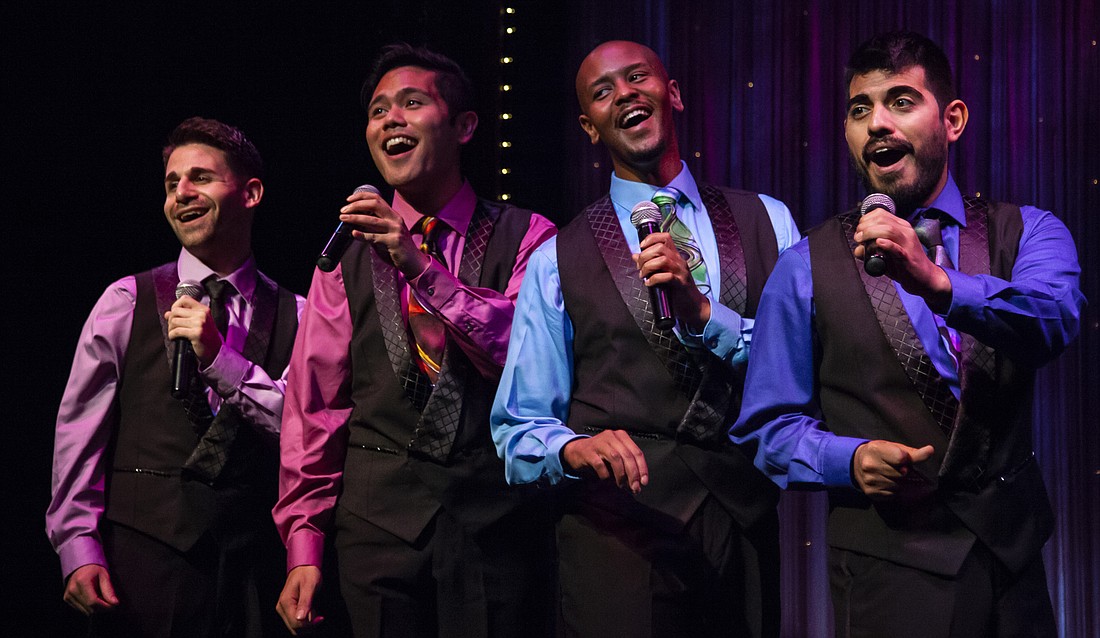- January 14, 2025
-
-
Loading

Loading

What African-American music style cracked the color line in the 1950s and went on to mainstream popularity? You’re probably thinking Rock and Roll. You’d be right, but it’s a multiple-choice question. Doo-wop is the other right answer.
“Unchained Melodies” sings the praises of this style on the Florida Studio Theatre cabaret stage. The revue is the brainchild of Rebecca and Richard Hopkins. (The title’s a nod to The Righteous Brothers’ “Unchained Melody.”) Catherine Randazzo directs with her usual snappy style. Nick Anastasia (second tenor), Nathaniel P. Claridad (baritone), David Marmanillo (bass) and Micah Jeremiah Mims (first tenor) comprise the all-male vocal ensemble. Jim Prosser arranged the tunes and does backup on keyboard. Doo-wop purists might call that cheating. But he makes the keyboard sing, to be fair.
The first act excavates the early history (and prehistory) of this a cappella artform. (Which wasn’t even called “doo-wop” until the 1970s.) You learn that the style emerged from the ghetto, not music college. (“Male harmony quartets” was the original term.) It all started with black musicians who couldn’t afford musical instruments. Necessity being the mother of invention, these singers used their voices instead. (Which explains the backup choruses of gibberish lyrics. “Who put the ram in the rama lama ding dong?” Now you know.) The original singers rehearsed in gyms, basements and bathrooms, performed on street corners, and didn’t do it for the money. Their harmonies eventually tickled the ears of A&R scouts from major record labels. They signed up a few Doo-Wop quartets. They did get money — at least until white recording artists co-opted their style.
The revue kicks off with a sampling of doo-wop’s early crossover hits like The Diamonds’ “Little Darlin,” The Platters’ “The Great Pretender” and The Marcels’ "Blue Moon." It’s sweet, sugary, melodic, innocent stuff — backed up by incredible harmonic sophistication. These spoonfuls of sonic sugar were mostly lovey-dovey, aside from The Silhouettes timeless teenage lament — “Get a Job.” (Parents, man. Even in the ’50s they didn’t get it.)
The second act explores doo-wop’s impact on the sounds of the ’60s. It kicks into a heavy rotation of hits by black ensembles including the gospel-like praise of “Get Ready” by Smokey Robinson & the Miracles, the hormonal harmony of The Drifters’ “Under the Boardwalk” and the Coasters’ goofy ode to a slacker student, “Charlie Brown.” White performers gradually make the scene, too. You get a snippet of The Tokens’ “The Lion Sleeps Tonight,” (complete with a mistranslation of the Zula word for lion), and Frankie Valli and the Four Seasons’ oddly high-pitched “Walk Like a Man.” There’s even a splash of the Beach Boys’ “God Only Knows” from their game-changing Pet Sounds album.
They’re all catchy tunes. But let’s talk about the musical elephant in the room ...
While the second-act hits are heavy on the harmony, they’re not strictly doo-wop. There’s instrumental back-up, don’t get me wrong. But it’s a step away from the original a cappella style.
Purists might call that a rip-off; I’d call it inevitable. Doo-wop was created by musicians couldn’t afford instruments. Once musicians had enough cash in their pockets to buy them, they did — and used them. It’s evolution, baby.
This revue has a solid spine, structurally speaking. It’s a smart crash course on doo-wop’s birth, life and subsequent offspring. Just ignore the obligatory banter between the singers, and you’ll learn something.
Music history aside, it’s an entertaining evening.
Prosser proves there's plenty of action left in his keyboard. Each vocalist takes a turn in the spotlight, while the others do nonsense backup, standing in for various instruments. (Roughly speaking, Marmanillo, Anastasia, Claridad and Mims are the human equivalents of bass, violin and alto sax. At least to my untrained ears.) The singers are all great, but Mims is world-class.
Mims floors the cabaret crowd with his righteous rendition of The Righteous Brothers’ “Unchained Melody” — the revue’s title song. (The cabaret crowd would’ve given him a standing ovation it the tables weren’t so tightly packed together.)
This revue’s great fun and it never gets heavy. At times, I wanted more weight. (I’d hoped for a nod to the experimental doo-wop of Frank Zappa’s Ruben and the Jets, but it was not to be.) “Unchained Melodies” keeps it light as cotton candy. Teen topics, no avant-garde experiments. This sweet meal is all dessert. While I crave red meat, I can see the logic behind it.
Doo-wop is a form of musical candy, after all. And candy’s mostly devoured by the young. There are no Doo-Wop odes to sciatica, second mortgages, Social Security and kids who won’t get off your lawn. Doo-wop sticks to the infinite permutations of young love (from makeups to breakups), juvenile delinquents, nagging parents and jobs.
It’s sophisticated music for unsophisticated young ears.
If you want to feel young again, lend your ears.
If you are young, get a job.